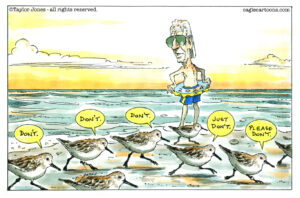When Democracy Doesn’t Work
In one of Tuesday's most disturbing election results, the losing candidates didn't even have opponents.In one of Tuesday’s most disturbing election results, the losing candidates didn’t even have opponents.
Three justices of the Iowa Supreme Court lost what is ordinarily a pro forma election to retain their seats. Not coincidentally, these justices were part of last year’s unanimous ruling to strike down a state law defining marriage as between a man and a woman. Outside groups opposed to same-sex marriage, including the National Organization for Marriage and the American Family Association, poured hundreds of thousands of dollars into television ads and other efforts to deny them a new term.
“Activist judges on Iowa’s Supreme Court have become political, ignoring the will of voters and imposing same-sex marriage on Iowa,” said one commercial. “Liberal, out-of-control judges ignoring our traditional values and legislating from the bench. … Send them a message. Vote no on retention of Supreme Court justices.”
Well, message sent — and that is the problem. The Iowa vote is part of a larger phenomenon of the increasing politicization of judicial elections: more money, more attack ads, more intervention by outside groups, from trial lawyers to business interests.
This is an unavoidable result of states’ decisions to give voters a say in judicial selection, whether through direct election of judges or retention votes. In 22 states, judges on the highest state court are chosen through elections and then either stand for re-election or face retention votes.
In another 16 states, high court judges are chosen in some other way but voters weigh in on keeping them. Some of the most prominent champions of judicial independence, including retired Supreme Court Justice Sandra Day O’Connor, have pointed to this approach — merit selection coupled with retention election — as a model for insulating the judiciary for undue political influence.
But the 2010 campaign illustrates the downside of judicial accountability and the threat of growing politicization of retention elections. In Illinois, where Supreme Court justices are chosen through elections and then subject to a retention vote, the decision about whether to keep incumbent Chief Justice Thomas Kilbride turned into a multimillion-dollar battle in the wake of Kilbride’s vote to overturn a state law limiting damages in medical malpractice suits. Kilbride won.
You might look at the Iowa results as a reasonable illustration of accountability in action. After all, what’s the point of building in accountability unless you’re willing to let voters hold judges accountable? But there is also a difference between giving voters the opportunity to remove judges who behave in inappropriate or unethical ways and letting retention elections turn into referendums on unpopular rulings. The courts may follow the election returns, but I don’t want judges making rulings with an eye on their own electoral fortunes.
I happen to agree with the Iowa court’s same-sex marriage decision, but I hope I’d feel the same way if the court had ruled in the opposite direction and gay rights groups fought to remove them. I vehemently disagree with the U.S. Supreme Court’s campaign finance ruling in the Citizens United case, but those who suggest the impeachment of Chief Justice John Roberts for that decision are even more off-base than the critics of the Iowa justices. Oregon Democratic Rep. Peter DeFazio told The Huffington Post that he was “investigating articles of impeachment against Justice Roberts for perjuring during his Senate hearings, where he said he wouldn’t be a judicial activist.” DeFazio can’t be serious.
There is an inherent tension between independence and accountability. When it comes to the judges — and when judicial activism is in the eye of the beholder — the system needs to be rigged, as the founders wisely did, in favor of independence.
Ruth Marcus’ e-mail address is marcusr(at symbol)washpost.com.
© 2010, Washington Post Writers Group
Your support matters…Independent journalism is under threat and overshadowed by heavily funded mainstream media.
You can help level the playing field. Become a member.
Your tax-deductible contribution keeps us digging beneath the headlines to give you thought-provoking, investigative reporting and analysis that unearths what's really happening- without compromise.
Give today to support our courageous, independent journalists.






You need to be a supporter to comment.
There are currently no responses to this article.
Be the first to respond.